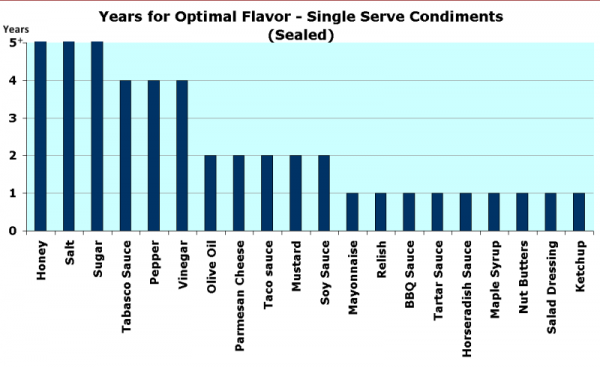Do you save unused condiment packets from fast-food restaurants? These packets can be handy when traveling or if you run out of something at home. Common single-serve packets include ketchup, mustard, mayonnaise, soy sauce, hot sauce, parmesan cheese, salad dressing, sugar, salt, pepper, and plastic jelly cups.
How long can you keep single-serve packets? If you examine the condiment, most do not have an expiration date. Packets are shipped by the thousand in bulk, and the recommended “Expiration Date” or “Best By” date (established by the manufacturer) is often only displayed on the bulk container rather than stamped on the individual packets. These dates are not official expiration dates but quality indicators to guarantee peak flavor and product quality. You can safely consume products after these dates if appropriately stored in a cool and dry area.
What is the shelf life of condiment packets?
There are no official guidelines from the USDA or FDA for condiments or other food. Except for infant formula and some baby foods, Federal regulations do not require product dates (source: fsis.usda.gov). Sealed foil-packaged condiments provide an impermeable barrier from light, air, and moisture, allowing the product to last for years if not decades.
Guidelines:
- How you store condiment packets affects their longevity. Unopened condiment packets can last for several months to a year if kept in a cool, dry place away from sunlight.
- Before consuming the condiment, inspect the packaging. Toss the packet if it appears puffy or damaged. When you open the packet, check the sauce’s color and texture and discard it if it has an odd coloration, texture, or odor.
- Condiments containing fats (mayo, butter) go rancid more quickly.
- Paper-based packets can spoil faster, although salt and granulated sugar do NOT go bad. Ground Pepper will lose flavor after 3 – 4 years as the oils dry out.
- Vinegar is safe to consume indefinitely due to its acetic acid content, but the packaged salad vinegar will lose its peak flavor in as little as one year.
- Honey does not spoil because of its high sugar and low moisture content. Make sure the honey is actual bee honey and not corn syrup.
- The plastic tubs of jelly with the top peel may last 2 – 3 years. Plastic creamers and margarine cups expire quickly and must be refrigerated.
We referenced a handful of resources – including the manufacturer’s recommended “Best By” dates, and compiled this data for some of the most common condiments.

| Condiment | For Optimal Flavor |
| Mayonnaise | 1 year |
| Relish | 1 year |
| BBQ Sauce | 1 year |
| Tartar Sauce | 1 year |
| Horseradish Sauce | 1 year |
| Maple Syrup | 1 year |
| Nut Butters – Almond, Peanut, Cashew | 1 year |
| Salad Dressing | 1 year |
| Ketchup | 1 year |
| Olive Oil | 1 – 2 years |
| Parmesan Cheese | 1 – 2 years |
| Taco sauce | 1 – 2 years |
| Mustard | 1 – 2 years |
| Soy Sauce | 1 – 2 years |
| Tabasco sauce | 3 – 4 years |
| Pepper | 3 – 4 years |
| Vinegar | 3 – 4 years |
| Honey | Indefinite |
| Salt | Indefinite |
| Sugar | Indefinite |
| Artificial Sweeteners | Eat at your own risk! |
Find something missing? StillTasty offers an accurate look-up tool for bottled condiments.
Find single-serve condiments like olive oil, hot sauce, lemon, and lime.
Finally, don’t forget to enjoy some real food packed with substance and plant-based spices. You may find you don’t want (or need) all those condiment packets covering up the taste!